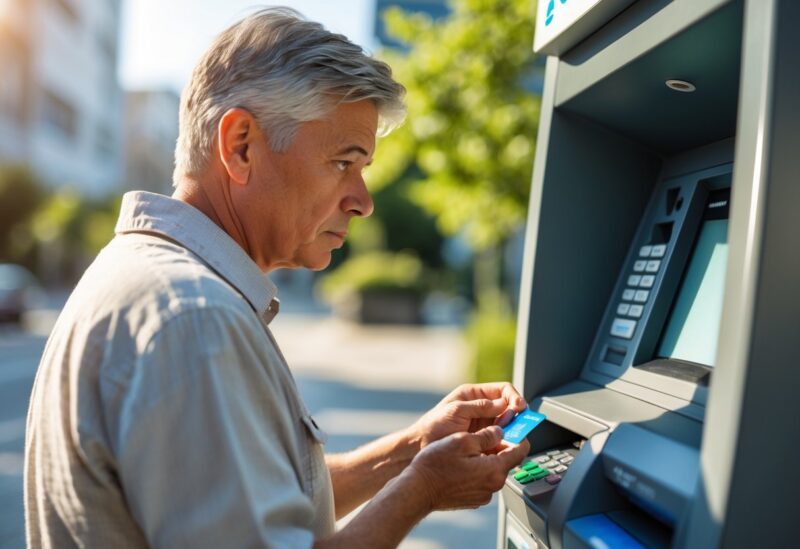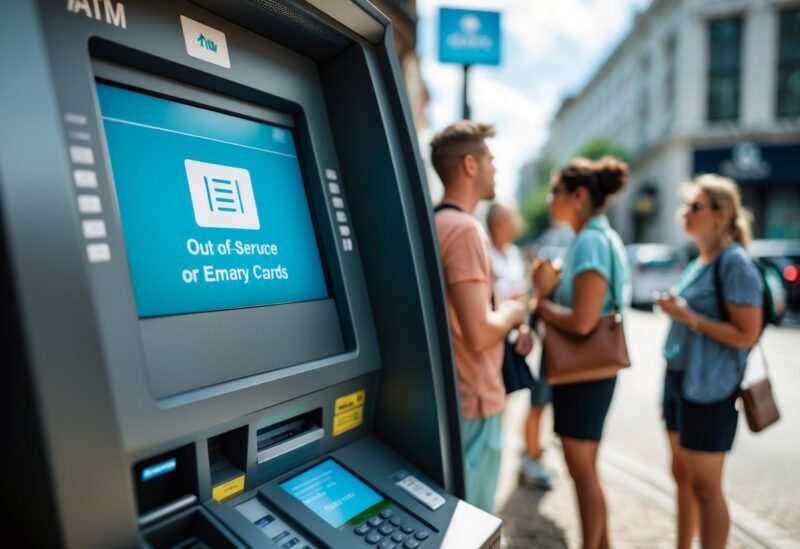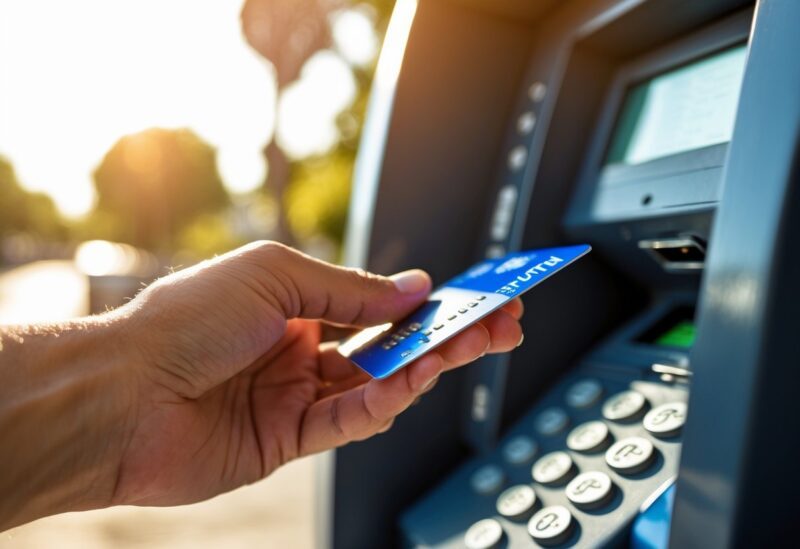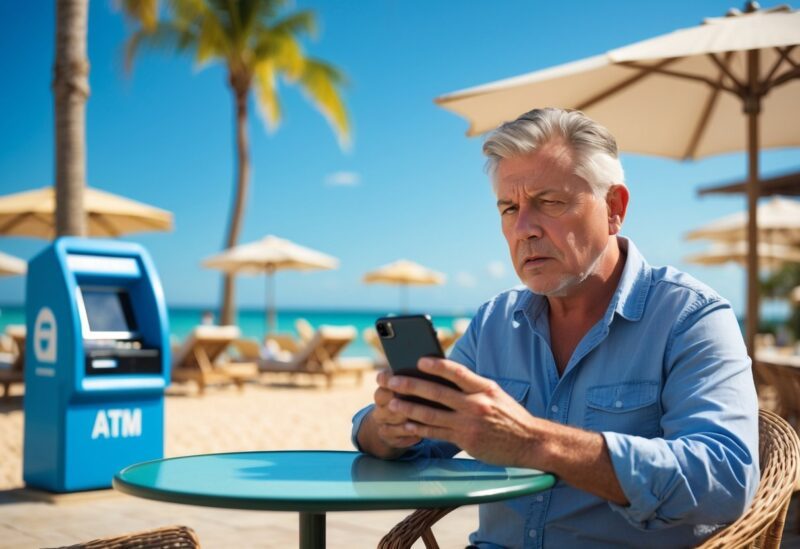Summer scams at ATMs and on the beach.

Summer rolls around and, for a lot of us, that means travel and a bit of downtime. But unfortunately, it also brings a spike in scams aimed at ATM users.
One trick that pops up a lot this time of year is the so-called “Lebanese trap.” Scammers set it up to catch people off guard while they’re on holiday.
If you can spot the warning signs, you’ll have a much better shot at avoiding trouble.
How the Scam Works
Fraudsters go after ATMs by attaching sneaky devices that mess with cash withdrawals. These gadgets block the money from coming out, making you think the machine’s busted.
When you try to get help, the ATM might flash a support number on the screen. Here’s the catch: the number goes straight to the scammers.
While you’re on the call, or sometimes through hidden tech, they grab your card info and your secret PIN. With those details, they can drain your account before you even realize what’s happened.
Step |
Description |
|---|---|
Device installation |
Criminals fix hardware to the ATM to block cash release. |
Fake support contact |
Users are told to call a fraudulent helpline number. |
Information theft |
Card details and PIN are stolen through the call or copying devices. |
Account depletion |
Scammers withdraw funds before the victim realises the theft. |
Scammers count on your trust and confusion when the ATM malfunctions. They want just enough data to get into your account before you catch on.
Most people feel safe at ATMs, not realizing crooks can install devices to steal your info. This scam works especially well during busy times, like holidays.
They mix physical tampering with social engineering, using fake calls that sound official. That combo makes it tough to spot the fraud right away.
Honestly, the best defense is staying sharp and checking the ATM for anything weird—especially if someone or the machine asks you to call a number.
Targeted Locations and Timing
Scammers get bolder in the summer, especially where there are lots of tourists. Those spots are packed, and people tend to let their guard down at the ATM.
ATMs near beaches, petrol stations, and out-of-the-way shopping areas are prime targets. High foot traffic or a remote spot gives scammers cover to do their thing without much risk.
Common Target Areas |
Reasons for Increased Risk |
|---|---|
Near beaches |
High volume of relaxed tourists |
Petrol stations |
Frequent short stops by drivers |
Remote commercial spots |
Less surveillance and fewer passers-by |
Timing matters, too. During summer holidays, people carry more cash or use their cards more, making them easy targets. If you’re aware of this, you’re already ahead of the game.
Signs to Watch For
Always give the ATM a quick once-over before using it. Anything sticking out, buttons that feel off, or parts that look like they don’t belong could mean tampering.
Look closely at the card slot and keypad. If something seems odd or clunky, it might be a device meant to steal your card details or PIN.
Cover the keypad with your hand or body when you type your PIN. It’s simple, but it stops hidden cameras from catching your code.
Tourists and holidaymakers are at higher risk since they use unfamiliar ATMs in busy places. Just being a bit more cautious can make a big difference in avoiding card info theft.
Here’s a quick checklist to keep in mind:
- Look for anything odd or broken on the ATM
- Skip machines that seem tampered with
- Always shield your PIN entry
- Stick to well-lit, secure ATM locations
- Watch out for anyone hanging around nearby
If something feels off, trust your gut and walk away. It’s better to be safe than sorry when it comes to your money.
What to Do If You Become a Victim
If you think your ATM card’s been cloned or you spot weird activity on your account, act fast. Don’t wait around hoping it’ll fix itself.
Call your bank immediately. They’ll block your card and look into any dodgy transactions.
Next, file a report with the police. That paperwork helps if you need to recover money or if authorities track down the scammers.
Keep notes of every call or email with your bank and the police. Jot down dates, times, and what was said—just in case you need it later.
Summary of key steps:
Step |
Action |
|---|---|
1. Contact the bank |
Request card blocking and account review |
2. Notify the police |
Submit a fraud report for official documentation |
3. Keep detailed records |
Maintain logs of all related communications |
Keep checking your bank statements for anything fishy. Report any suspicious activity right away—don’t assume it’s a glitch.
Preventive Actions
To dodge scams like the Lebanese trap, use ATMs inside banks or in crowded spots with cameras. Crooks are less likely to mess with those.
Set up transaction alerts on your phone—either by SMS or through your bank’s app. That way, you’ll know instantly if money leaves your account.
It’s also smart to put limits on how much you can withdraw or spend each day. That limits the damage if someone gets your card info.
Check your bank statements often. If you spot anything odd, you can report it before things get worse.
Key points to remember:
Action |
Reason |
|---|---|
Use ATMs inside banks or busy areas |
Safer, fewer chances of tampering |
Activate transaction alerts |
Immediate notice of any withdrawal |
Set transaction limits |
Limits losses if card is compromised |
Monitor bank account often |
Early detection of fraud |
Honestly, these steps aren’t hard, and they go a long way in protecting you from ATM scams—especially during peak scam season.
Stay Alert Even During Holidays
Financial safety doesn’t take a holiday, even if you do. Summer feels like the perfect time to relax, but you’ve got to stay sharp at the ATM. The “Lebanese Loop” scam proves that letting your guard down, just for a second, can cost you a lot.
Scammers use clever devices to block or snag ATM cards. Sometimes, they install fake stuff that traps your card, making it easy to steal your info or your cash later on.
To stay safe, try these tips:
- Set limits on transactions: Keep daily spending and withdrawal limits low.
- Check bank statements frequently: Review accounts often to spot any unusual activity early.
- Inspect ATMs before use: Look for signs of tampering, such as loose parts or added devices on the card reader.
- Use bank branch ATMs when possible: These are generally more secure than standalone machines.
It’s easy to get distracted when you’re traveling or just trying to enjoy your break. But these small steps really do help protect your money from theft or fraud.
Simple preventive measures keep your account safer, especially when scammers get more active. The best defense? Stay informed and alert—especially at the ATM.
Price Gouging at Marathi Beach: Breaking the €8 Set Price Limit
At Marathi beach (Chania), people are noticing a pretty blatant case of price gouging as the crowds roll in for summer. The official price to rent a sunbed and towel set is supposed to be capped at €8.
But lately, vendors have been asking for a lot more, especially if you want to snag a spot close to the water. It’s not exactly subtle.
Key points about the price increase:
Item |
Official Price Limit |
Charged Price at Marathi Beach |
|---|---|---|
Sunbed and Towel Set (standard) |
€8 |
€15 to €25 |
Front Row Sunbeds |
Double the normal price |
Around €25 |
If you want that front-row seat, you’re looking at nearly triple the official price. That’s left a lot of holidaymakers feeling annoyed and a bit trapped—pay up or miss out.
Vendors usually defend these higher prices by blaming demand and the “privilege” of sitting right at the edge of the sea. Direct views, easy access—sure, but it still breaks local regulations designed to keep things fair.
Effects of this pricing behaviour:
- Tourists with tighter budgets skip the front row entirely.
- Some people just leave or look for a different beach.
- Folks have filed complaints with local authorities, hoping someone will actually enforce the price cap.
Tips for visitors to avoid overpayment:
- Always check the set rental prices before you agree to anything.
- Try spots farther back from the water—they’re usually cheaper.
- If you get charged way too much, let local consumer protection know.
Local media and social platforms have started picking up on these complaints, shining a light on the whole mess of price exploitation at Marathi beach during the busy season.








